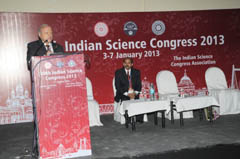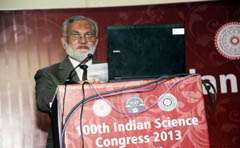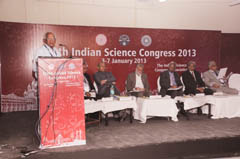Kolkata, 4th January, 2013
 Dr. P. K. Ghosh, Sectional President, Agriculture and Forestry Science and Director, Indian Grassland and Fodder Research Institute (ICAR), Jhansi delivered presidential address on “A Paradigm Shift in Managing Natural Resources and Food Security: Strategy to Action”. The session was chaired by Prof. M. S. Swaminathan, Member of Parliament (Rajya Sabha) & Chairman MSSRF, Chennai, Acharya Prafulla Chandra Ray Siksha Prangan of Calcutta University. In his Platinum Jubilee Lecture, Dr. S. Ayyappan, Secretary, DARE and DG, ICAR, New Delhi, addressed the august gathering on “ABC of Climate Smart Agriculture”.
Dr. P. K. Ghosh, Sectional President, Agriculture and Forestry Science and Director, Indian Grassland and Fodder Research Institute (ICAR), Jhansi delivered presidential address on “A Paradigm Shift in Managing Natural Resources and Food Security: Strategy to Action”. The session was chaired by Prof. M. S. Swaminathan, Member of Parliament (Rajya Sabha) & Chairman MSSRF, Chennai, Acharya Prafulla Chandra Ray Siksha Prangan of Calcutta University. In his Platinum Jubilee Lecture, Dr. S. Ayyappan, Secretary, DARE and DG, ICAR, New Delhi, addressed the august gathering on “ABC of Climate Smart Agriculture”.
 A special issue-based panel discussion on “Ending Era of Farmers’ Suicide” was held in the Agriculture and Forestry Sciences Section. The distinguished panelists included Prof. M. S. Swaminathan, Member of Parliament (Rajya Sabha); Dr R. B. Singh, President NAAS; Dr S. Ayyappan, Secretary, DARE & DG ICAR; Dr. S. A. Patil, Chairman, Karnataka Krishi Mission; Dr. C. D. Mayee, Former Chairman, ASRB; Dr. S. K. Datta, DDG (CS), ICAR; Dr. A. N. Mukhopadhyay, Former VC, AAU, Jorhat; Dr. A. K. Srivastava, Director, NDRI and Mr. N. Subba Rao, Farmer’s Representative, West Godavari Distt, A. P.
A special issue-based panel discussion on “Ending Era of Farmers’ Suicide” was held in the Agriculture and Forestry Sciences Section. The distinguished panelists included Prof. M. S. Swaminathan, Member of Parliament (Rajya Sabha); Dr R. B. Singh, President NAAS; Dr S. Ayyappan, Secretary, DARE & DG ICAR; Dr. S. A. Patil, Chairman, Karnataka Krishi Mission; Dr. C. D. Mayee, Former Chairman, ASRB; Dr. S. K. Datta, DDG (CS), ICAR; Dr. A. N. Mukhopadhyay, Former VC, AAU, Jorhat; Dr. A. K. Srivastava, Director, NDRI and Mr. N. Subba Rao, Farmer’s Representative, West Godavari Distt, A. P.
Prof. M. S. Swaminathan quoted that the Farming is a life giving profession and farmers are life givers to us. He has suggested three major steps to overcome the crisis such as (i) Diversification of source of income, through Rural System Research Cropping System Research (crop – crop / food crop - fodder) and Farming System Research (crop – livestock); (ii) A mechanism of social support in the form of a fund, which he referred as ‘Life Saving Fund’ (iii) Errors minimised agronomy to avoid or reduce degradation, which should be profit maximising and risk minimising.
Prof. R B Singh pointed out that farmers are the backbone of the nation and the nation faced 17 years of human tragedy as during this period about 3 lakhs farmers committed suicide and left their family to suffer with same distress. Mr. N Subba Rao had explained that non-availability of inputs, labour problems, high cost of cultivation, uncertainties of crop produc tivity, poor marketing scope, crop failure, are the main cause of suicide among farming community and forced them to observe crop holidays for several years.
tivity, poor marketing scope, crop failure, are the main cause of suicide among farming community and forced them to observe crop holidays for several years.
Dr. S. Ayyappan suggested ensuring high input support, crop diversification, special technological packages, adoption of credit policy and financial assistance are needed for every farmer. He emphasized on creation of value addition and small scale construction of storage structures at village level.
Dr. S A Patil, Chairman, briefed on the need of low-cost technologies and policies for adoption by small and marginal farmers of the country.
Dr. Swapan K Datta indicated that farmers’ suicide is more of collective societal failure. Although we have updated multi-dimensionally ourselves in terms of economic, scientific and technological development, he suggested for consolidation of land and to stop fragmentation, increase water productivity and reduce post-harvest loss.
Dr. C D Mayee put forth examples of Group farming which is a collective efforts where the agriculture operations are distributed among people according to individuals’ expertise as an effective measure of controlling farmers’ suicide.
Dr. A N Mukhopadyay insisted for cooperative system and suggested for effective infrastructure and procurement of perishable agricultural produce from the farming community so that they could be economically secured.
Dr. A K Srivastava expressed his views on integrated farming that includes strengthening of livestock and dairy sector as major proportion of GDP is shared by these components. He suggested for selective breeding and conservation of local germplasm instead of blind approach for cross breeding using exotic germplasm.
Major recommendations from the Panel Discussion
- Inputs and credit support and procurement of produce to farming community at each block level
- Adopt Integrated farming system which also includes strengthening of livestock and dairy sector
- Prevention of land fragmentation. Consolidation of land, effective Government interventions and policy support.
- Enhancing economic conditions of farming community
- Group farming consisting of a collective approach of a farming community to work together with appropriate work distribution
- Crop diversification, intercropping and alternate low risk crops under rainfed
- Use of cooperative system model for procurement of farm produce of government to ensure best economic return to farming community.
- To stop subsidy instead providing monetary support for social security to farming community
- Development of low cost technologies for farming community
- Promote custom hiring, market intelligence and family-farming agribusiness
- To educate and train youth for adoption of agriculture science as career and knowledge sharing with farming community.
(Source: Director, IGFRI, Jhansi)







फेसबुक पर लाइक करें
यूट्यूब पर सदस्यता लें
X पर फॉलो करना X
इंस्टाग्राम पर लाइक करें